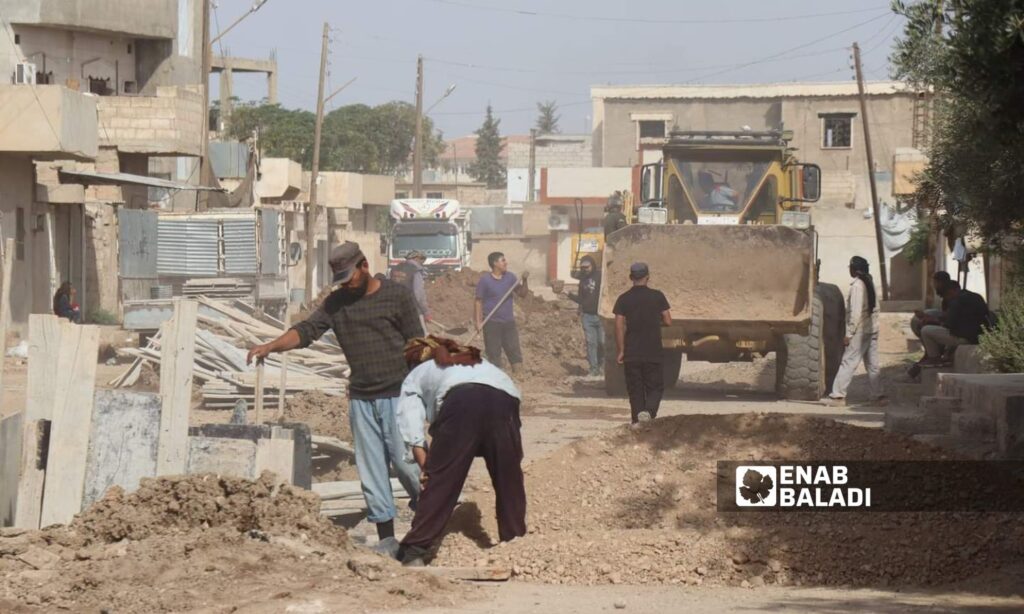During the period of control by the Autonomous Administration of North and East Syria (AANES) (whose military arm is the Syrian Democratic Forces “SDF”), over the city of Ras al-Ain, northwest of al-Hasakah, before 2019, many tunnels were dug as part of their conflict with the Syrian National Army (SNA) supported by Turkey.
Five years after control was transferred to their rivals (the Syrian Interim Government), the effects of these tunnels are still evident in the city’s service sector. Despite ongoing efforts to maintain the sewage network, the impacts of the military tunnels cast a heavy shadow on the roads, especially with the approach of winter.
Sewage problems surface during winter in the city of Ras al-Ain, northwest of al-Hasakah – September 10, 2024 (Enab Baladi)
Winter brings seasonal fears
The residents of Ras al-Ain experience increased fears of waterway flooding with the increase in rainfall during winter. Neighborhoods suffer from pipe blockages and sewage leaks, raising the risk of disease spread and environmental pollution.
At this time, the repair and maintenance efforts appear insufficient to address the damages caused by the military tunnels that have destroyed the underground infrastructure and extensions.
Ahmed al-Ali, a resident of Ras al-Ain, told Enab Baladi that despite the maintenance of the sewage network in the al-Hawarna neighborhood several times, issues of polluted water flooding and leakage return whenever it rains, negatively affecting his family’s and children’s health.
Al-Ali explained that last winter he suffered from water pooling in the streets when heavy rains caused sewer blockages, damaging people’s properties and hindering daily movement. He considered the current maintenance insufficient as there is a deeper unresolved problem, calling on local authorities to apply fundamental solutions.
Mohammad al-Kamal, another resident of Ras al-Ain, told Enab Baladi that sewage problems decline in the summer but become prominent in winter. He considers the municipality’s maintenance in this regard to provide temporary improvements but does not end the problem.
Al-Kamal also called on the local authorities to implement reforms that would enhance the effectiveness of the sewage network during severe weather conditions.
The local councils primarily rely on humanitarian organization support due to a severe revenue shortage and lack of independent income sources. These councils face difficulties in achieving financial sustainability and await the implementation of projects funded by organizations to meet their basic needs and improve conditions in their areas.
Local councils and some organizations undertake sewage network maintenance tasks in Ras al-Ain, while support from the Syrian Interim Government is absent in this regard – September 10, 2024 (Enab Baladi)
$2 million for sewage network maintenance
An engineer in Ras al-Ain explained to Enab Baladi that the sewage network suffered significant damage due to the excavations carried out by the SDF from 2016 until their departure.
The engineer clarified that the initial assessment showed that the maintenance cost of the network is estimated at about $2 million. He noted that the damages to the sewage network also affected the water supply network, further complicating the maintenance process as it requires massive financial capabilities, substantial resources, and modern equipment that are hard to secure.
He pointed out that the local council began maintenance work but its limited financial capabilities hinder the complete work. He noted that one organization started maintaining part of the network, but due to the international siege on the city, as he put it, the organizations lack the capacity to provide sufficient support, making the replacement of the entire network an urgent necessity. Meanwhile, maintenance requires significant funding and continuous efforts to ensure comprehensive improvement.
The tunnels dug by the SDF in Ras al-Ain years ago have had negative impacts on the sewage networks in the city located northwest of al-Hasakah – September 10, 2024 (Enab Baladi)
Omar al-Kanjou, the director of the sewage department in the local council of Ras al-Ain, told Enab Baladi that most neighborhoods in the city need a complete replacement of the sewage networks, as the tunnels dug by the SDF in the city destroyed more than 80% of the existing networks.
Al-Kanjou clarified that the local council, in cooperation with organizations, managed to conduct maintenance for about ten kilometers out of the 65 kilometers that need maintenance in the city. He also mentioned that the cost of closing the tunnels that caused these damages is very high and exceeds available capabilities.
He added that the local council has a plan to maintain ten additional neighborhoods in the coming period, in an attempt to improve the situation gradually.
The lack of support from the Interim Government for local councils increases the difficulty of implementing essential projects, leaving these councils unable to efficiently meet infrastructure and basic service needs due to their limited available resources.
Ras al-Ain is located along the Turkish border and is controlled by the Syrian National Army supported by Turkey, while it is surrounded by frontlines with the SDF. Its only external access is the Turkish border.

